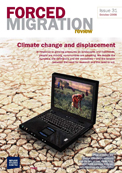(The Ecologist) November 11, 2010 – The causes of climate change are far from their shores, but these tiny Pacific nations face growing social strife and eventual annihilation unless western governments wake up and take responsibility, argue Scott Leckie and Dan Lewis.
Tessie Eria Lambourne’s bright smile belies a deeper sense of unease for which she as the secretary of Kiribati’s foreign ministry is responsible for imparting to the wider world. Lambourne is entrusted with no small task; she and her government face a choice no government should ever have to make. Fight or flight? The issues her government faces are both unprecedented and extraordinarily complex.
Ms Lambourne’s brief essentially entails nothing less than determining whether to fight for the very survival of her homeland or to pursue options overseas for the country’s threatened citizens. This is the new dilemma in a world where ever more people are facing the prospect that their homes and lands will be lost forever. Especially so in the case of atoll nations such as Kiribati and Tuvalu. The choice to battle the rising seas or set one’s families up in larger, distant nations is a very real one facing everyone in these two lands.
Ms Lambourne is not alone in her fight. Officials in nearby Tuvalu also grapple with the same questions. The unparalleled political wrangle of securing the best possible future for the entire populations of both countries, while watching rising seas from dwindling shorelines, is a mighty one.
Interestingly, though, while Kiribati is pursuing a multi-dimensional policy, combining the protection of shorelines, the construction of new neighbourhoods to ease overcrowding in the capital Tarawa, and labour-mobility programmes designed to provide improved employment options to those choosing to relocate to countries such as New Zealand or Australia, it appears that Tuvalu, at the government level at least, is taking a stand to stay and fight until the bitter end.
Lack of resources
Two of the smallest countries in the world, Kiribati and Tuvalu are also the ones with most to lose. Sadly, they have access to few resources to overcome the threats already evident along their shores. Additionally, in-migration from outer islands to the urban settlements of Betio in Kiribati and Funafuti in Tuvalu complicate an already strained environment.
The emergence of squatter settlements have increased densities, exacerbated health problems, put extraordinary pressure on limited water and sanitation systems, and compromised customary obligations of responsibility for extended family. The reason, as in all countries, is the perception that livelihoods, social opportunity and access to development opportunities are greater in urban contexts, and the result follows urbanisation trends globally.
The nexus of urbanisation and climate change, whatever the causes, is happening in both countries. Measurable changes in meteorological systems producing stronger and more frequent storms; disruption of rainfall patterns; rising sea temperatures – all contribute to increased vulnerability in every country in the world, and are particularly acute in the fragile slivers of crowded land that make up atoll countries such as Kiribati and Tuvalu.
Perhaps no other nations are as comprehensively threatened by climate change as these two. Preserving them, and
protecting the full spectrum of human rights of the people of these tiny specks of green in the middle of the Pacific, is a challenge to which we all must rise.
Migration
Apula, a seafarer returning home to Tuvalu after nine months on the high seas, sees things differently though. A former government conservation officer, Apula left home for the maritime salary that could guarantee his wife and children future prosperity in New Zealand, which he could never acquire in the islands. Like him, many within the younger generation of Tuvaluans are increasingly inclined towards migrating to New Zealand or Australia than building up the nation’s defences against increasing erosion, higher seas and consequent deepened risk from more frequent tsunamis, king tides and severe weather.
Source: The Ecologist



